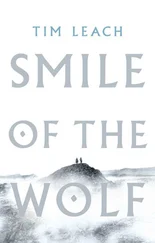‘I see no father of yours here.’
‘There is not. And he did not die in battle.’
The Roman nodded, as if he understood. ‘That is why she hates you? Because you killed your father?’
A sour twist of the mouth. ‘No,’ Kai said. ‘She hates me because I could not. Because she had to.’
There was silence between them. And in the darkness Kai saw it once more – the armoured figure pushing through the killing circle, his sister taking up the blade that Kai had cast down, the light on the blade, and the blood upon the grass. The first man she had ever killed.
Then the Roman said: ‘A terrible thing, for a child to kill their father.’
Beside him, Kai felt Arite shudder. ‘And what about those who kill their children?’ she said.
It was then, at last, that Kai thought he understood. He turned to the Roman. ‘Get out. Now.’
Lucius crawled past them, out towards the light. And he paused at the entrance of the caravan – perhaps there was something that he too longed to speak. But, it seemed, the Roman could not find the words, and then he was gone from them.
Through the walls of the tented wagon, deadened a little by the fabric, Kai listened to the movement of the camp. The barking sounds of an argument, one of those petty quarrels of starving men. The rasp of a weapon being sharpened, over and over again, as though its bearer hoped that a sharper sword would somehow undo the force of the Legion. One of the gentle, looping songs of their people, where rhythm became ritual and the old stories were told over and over and over again. Somewhere there was weeping – for a moment he thought that it might be Arite, but when he put his hands to her face he found it dry.
‘You saw something out there, I think,’ said Kai. ‘Something worse than I did. A ghost?’
She nodded. ‘Two ghosts.’
‘You can speak to me of this pain. If you want to.’
‘It is shame. Not pain.’
‘Then you may tell me of that instead.’
‘Did talking of your shame help you?’
A pause. ‘Mine was never hidden.’
She spoke then. Not in sadness, but with a kind of still fury. If her words had been the stroke of a sword, it would have been the final, downward cut. ‘Do you know why I sent my son with you?’ she said. ‘He was so young, younger than his years. A gentle boy, who played with those wooden horses you used to carve and shunned the spear. None would have questioned Bahadur if he had kept Chodona behind. And it was I who insisted he must go.’
‘Duty,’ Kai said at once. ‘It was a brave thing, to send him with us. You did your people a great honour.’
‘No. It was not for that. I wanted to believe it was so at the time, but it was not for that.’
It took her a long time to say anything more. Kai remained as still as he could, for perhaps it was only in forgetting that he was there that she might let herself speak the truth.
At last, the words did come.
‘I wanted him to go with his father,’ she said, ‘for I thought it might mean Bahadur would keep both of them safe. He would have his son to protect, and would not take a hero’s risks. I thought they would both come back. That they would run, if they had the chance.’ She reached out her hands to Kai, but closed her eyes as she did so. Perhaps it was to imagine that he was someone else that she could touch.
‘I gambled them both,’ Arite said, ‘and I lost them both.’
Silence, then.
‘You have nothing to say to that?’ she said.
Kai pulled his hands away from her, for he had the old longing now for sword and spear – that close feeling in the chest and touch of heat at the centre of the back. The warrior’s longing to fight, to kill through that pain. To contend with something other than shadows and grief.
The tears did come then, hot and quick as blood from a blade. And they were not her tears, but his.
Afterwards, he would wonder at why it happened. If it was still a ghost she sought in the darkness, or perhaps she simply did not know what else to do. For she took him into her arms then, held him close against her, and she began to kiss those tears away.
For a moment, as she woke, Arite could believe it was her husband’s arms that she lay in. That touch of flesh, the feel of a body in the darkness almost familiar. But her hands traced across the shoulder and searched for a scar that was not there, and in the hollow of the neck, the smell of sweat and flesh that was not the one that she loved. For not even in the great stories of gods and heroes was there an unravelling of time, any more than water might flow uphill. The dead remained dead, and what had been done could not be undone.
The light was still strong when she left the tented wagon, but not so strong as she thought it would be, the sun falling from the sky. There was another light close by, from the embers of a fire that should have gone out many hours before. And there, tending those embers, was Lucius.
He looked up at her. ‘The fire was dying down,’ he said simply.
She said nothing for a time. Then: ‘Did you think to run?’
‘I did. To take a horse and some food. Follow the stars and the rivers to the west.’
‘Why didn’t you?’
‘I do not think the Roman has been born that might outride a Sarmatian.’
‘I think that you are brave enough to take the chance and find out.’
‘Perhaps that is true.’ He stirred the fire once more, and when he spoke again, it was slowly, each word carefully weighted and measured. ‘My gods are different to yours. I have my own way of speaking to them. And they did not tell me to run.’ He hesitated. ‘What would they have done to you, if they found me gone?’
‘I cannot say. That would have been up to the chieftains. Nothing, perhaps. They might consider you a stray horse and nothing more. Our own foolish loss.’ She sat down, the patterned soles of her boots towards him. ‘Or they might have had us flayed alive,’ she said, matter-of-factly, ‘for letting an enemy escape.’
‘I would not wish that for you.’
‘Why not? You rode into my village to kill me.’
‘I might equally ask why you let me live.’
She inclined her head to him, the way a sparring partner might acknowledge a good touch. ‘I do not know what will happen to you,’ she said. ‘When we leave this place.’ She gestured about the camp, that impossible gathering of warring clans. ‘This is a place that exists out of time. A stolen season, while we decide what path our people will take. When it is settled, other things may be settled too. Some may look on you as bad luck.’
‘That would be reason enough, I suppose. Men have been killed for less than that.’ He hesitated. ‘Is it true, that you sacrifice people to your gods?’
‘I have heard that our grandfathers did. The Scythians, out upon the steppe. But no longer.’ She held a hand towards the fire. ‘If it is to be death for you, I shall give it to you quickly myself.’
‘If it is to be death for me, I shall die by my own hand. My people have never feared to do that.’ The sunlight shone on his hair as he looked away from her, watching the motion of the camp. For it was stirring to life, horses and wagons carrying their burdens towards the heart of the encampment. Men stood combing and braiding their long hair, women could be seen gathering in circles and practising the intricate steps of a dance. ‘Something happens tonight?’ he said.
‘There will be a feast.’ She smiled then, seeing the doubt on his face. ‘Oh, we came close to starving this winter. But you shall see. Our people can find a way to feast and dance, even at the ending of the world. And after the feast, we break camp. The Five Clans will part, and return to their lands. We shall return to the west.’
Читать дальше
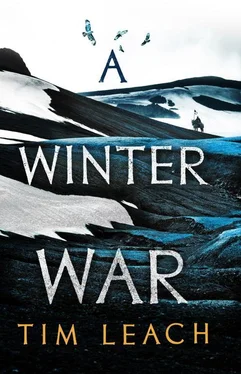
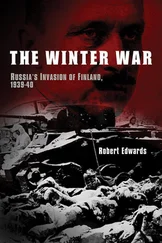

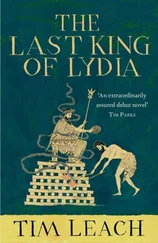
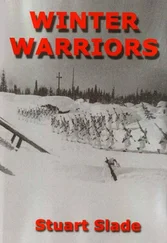
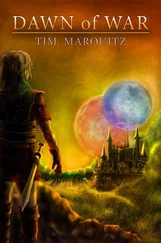

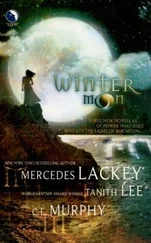
![Стюарт Слейд - Воины зимы [Winter Warriors ru]](/books/401383/styuart-slejd-voiny-zimy-winter-warriors-ru-thumb.webp)
